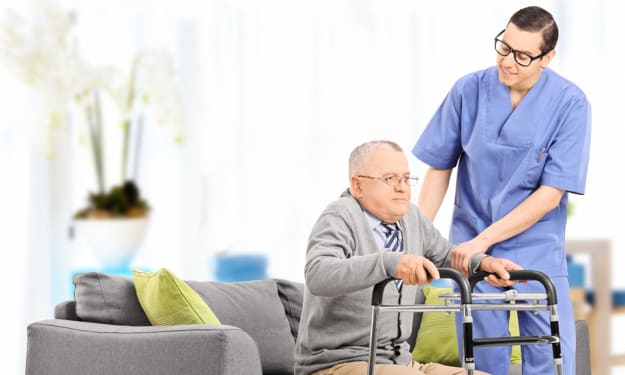Tips for Male Live-in Carers
Health

"Hard times don't create heroes. It is during the hard times when the hero within us is revealed." -Bob Riley.
Over the past few decades, there has been a vast growth of male live-in care workers. However, even today, when we think about men doing traditional household work, such as cooking, washing dishes, laundering, etc., we still come up with a surprise. Caregiving is indeed associated with females, but what we don't realize is that irrespective of our gender, we all can provide care.
Traditionally, women have always been expected to care for people in their lives. However, recent studies have shown that men are more likely to participate in the care industry. Men can be just as patient, efficient, nurturing, and understanding as women. Indeed, men are often regarded as hard and strong, but there are a lot of elderly and disabled men who prefer male live-in carers. It happens especially when it comes to personal care like bathing, using toiletries, and getting dressed. This idea of a "big, strong man who can do anything" fascinates most residents. These are the things that increase the demands of male live-in carers. This article has enumerated some details about care job to help you understand if this career option is right for you.
Let’s see how male live-in carers can improve their caregiving skills.
Do Your Research
Researching your patient's medical condition will help you gain a contemporary perspective. Gathering as much information as possible about their health is important to ensure that your care recipient is in good health. Health research is crucial for live-in caregivers. It will provide you with essential information about their health condition, risk factors, functional abilities, patterns of care, and much more. Furthermore, inquire about community support groups available in your area. It will guide you through the procedure and give you the most suitable alternative for an ailing member.
Acquire Practical Skills
The journey will indeed be challenging. You might get a few difficult assignments initially but remember: practice makes a man perfect. Developing practical skills will help you gain expertise in no time. You can also seek professional help from your senior live-in carers if necessary. You can become the best male live-in caregiver with their assistance regarding medical and nursing matters. Furthermore, you can also participate in different courses and seminars near you to enhance your skills. Nevertheless, you can likewise browse online resources if there are no options.
Practice Open Communication
Open communication is one of the most crucial elements for a male caregiver. Your patients are already at the most vulnerable stage of their lives. Most of these members often feel like a burden or a nuisance. As their caregiver, you will be responsible for being patient, kind, and empathetic with them. Open communication enables you to establish an effective rapport with your care recipient. Building strong interpersonal relationships will help you solicit sensitive health information and work efficiently.
Practice Patience
As a male live-in carer, you must be patient with yourself and your residents. Being patient with yourself will allow you to keep yourself calm. Remember, making mistakes is OK-all humans do—but always try to give it your best.
Communication can be tough for vulnerable people. They often get annoyed by the most insignificant things. This pain and frustration make them feel like a burden on their family members, triggering their mood swings and leading to depression and anxiety. Handling these mood swings can be challenging, but you must be patient and empathic. One way to do this is to avoid taking anything personally and remember that they are struggling through a tough phase of their lives. In this regard, address and treat their feelings with respect and dignity.
Do Not Rely On Brute Strength
If the person you're caring for is especially disabled, you might have the urge to use your strength to assist with ADLs or transfers. Of course, there may be instances when this is required, but doing it frequently puts you in danger of getting hurt.
Follow the lead of licensed physical therapists emphasizing leverage and knowledge of biodynamics more than just muscle strength. We have witnessed thinner men helping larger-framed male patients, which is unhealthy for their health. Thus, it is safer for you and better for your patients' physical and mental health if you let them participate in minor activities as much as is feasible.
Establish Boundaries
Boundaries are the framework within which the clinician-client relationship exists. It provides the parameters for services, making the relationship professional and safe for both parties. Even when you spend most of your time sharing the most intimate moments with that one person, it is still essential to establish healthy boundaries. These boundaries include knowing your limitations, the time of a session, the limits of personal disclosure, and your comfort level.
Boundaries also play a crucial role for the care recipient. What are the things they are uncomfortable about? What are their likes and dislikes, etc.? These things maintain a healthy balance between both ends of the relationship.
Self-Care Is Non-Negotiable
The overwhelming feeling we get when caring for someone ill often makes us forget about our happiness. There are better approaches than this. No matter what profession you are in, giving yourself some time and taking care of yourself is imperative. Do things that calm your soul, whether swimming, a sports activity, a movie, or a drink with your friends. It is a non-negotiable thing. Even if you have a busy schedule, you can consider doing these basic things:
• Exercise (even for 30 minutes every day)
• Eat healthily
• Take enough sleep
• Remember to hydrate yourself.
• Talk to someone if you feel anxious.
• Get some laughs
Do The Nitty-Gritty Tasks
Even in the 21st century, men are known for not doing nitty-gritty tasks like feeding and bathing their patients. Depending on your circumstances, you might want to hire additional help to handle these tasks, but we advise you to get used to taking everything on your own. As a caregiver, it is solely your responsibility to manage the private functions of your care recipient. While it is no picnic, you must be comfortable and prepared for any emergency.
The Bottom Line
Today, formerly stigmatized male carers are more prevalent and accepted, whereas women once predominated. Nevertheless, role bias is still present due to social expectations of men and ingrained stereotypes about carers. So, isn't it time to change our prejudices? After all, we don't question a female pilot or a male nurse. As a society, we are responsible for normalizing men as care workers and ensuring that both genders can be equally efficient in their job responsibilities.
Source-https://medium.com/@guardiancarersuk/tips-for-male-live-in-carers-1b9b682d27e5
About the Creator
Guardian Angels
Guardian Angel Carers is a professional home care company in the UK that offers exceptional, high-quality care and support for your loved ones in the comfort of your own home.
Website:- https://www.gacarers.co.uk/






Comments
There are no comments for this story
Be the first to respond and start the conversation.